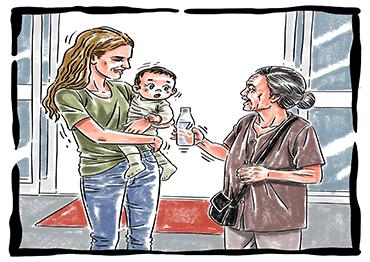My Chinese mother-in-law looked like a fragile little lady, with tiny pretty hands and a laugh like the tinkle of sweet fairy bells, but she was tough as hell. Measuring 1.42 meters and weighing a good 40 kilos soaking wet, she continued to cycle to work at the military academy well past the age of 60, and was rumoured to have been on the Long March. (She never confirmed nor denied.)
I loved her from the moment I first saw her, jumping up and down at the airport, as she tried to catch a glimpse of her first grandchild. She jumped up and down for several hours, peeking through a small high window in the door that separated us: I was fine, but my husband had an issue which took Customs and Immigration some time to figure out. I stood in the hallway, surrounded by all our luggage, holding a 16-week-old infant, ready to pass out from exhaustion from a 36-hour journey, buoyed by the sight of that tiny white head popping into view for hours on end. If she wasn’t going to give in to exhaustion, neither was I. When my husband (and our passports) were finally released, my mother-in-law did the loveliest thing ever: she handed me a jar of water, and asked if she could hold her grandchild. Asked! Not demanded! The woman had boiled water for me, put it into a recycled glass jar with a lid, then traveled from her home to the airport with that precious gift to hand to me at 2 am. Note: She didn’t bring water for her son. Nainai (grandma) was then up at 5 am to cycle to her job, without complaint. That’s a special kind of tough, and that’s a special kind of love.
And love was needed: Lord, I was stupid. A Chinese household in the early 90s was a different place to negotiate than one today. The washing machine (we were rich) had to be hooked up manually with cheap plastic hoses that constantly disengaged themselves from the faucet. We turned on the water, stood over the tub to make sure the hose stayed secured, turned off the faucet when the tub had enough (not full, just full enough), then set the timer to agitate the clothes. When it was time to rinse the clothes, the water was drained into enamel basins to be saved for flushing the toilet, then the wet clothes were pulled out and carefully packed around a spinning drum. The clothes had to be perfectly balanced or the spinner wouldn’t work. After ensuring the spinning happened, the clothes were pulled out, put back into the tub, and the tub was refilled. Not only did she have to show me how to do this, but she didn’t complain about the amount of water needed to wash Baby’s diapers, and she let me have a second rinse as well.
She never raised her voice or belittled me. When I stepped backwards into a plastic bucket full of water, she laughed until she cried. She never complained. She never spoke about her life in the military, of being orphaned at 10, of her job, except to mention once how kind Zhou Enlai was. My Chinese was still at the ni hao (hello) level so I couldn’t ask many questions, and my husband quickly tired of being the interpreter. I knew that she had served in the military at the same series of conflicts as my dad, albeit on different sides, and yet here was proof in the form of a sweet baby girl that love transcends politics. Still, I wondered at what point politics would intrude on our family life. I didn’t have to wait long. I heard Nainai singing a lovely little tune to the baby. A family member tried to hush her, but Nainai replied, “She doesn’t understand.” (That would be me, not the baby.) My ears perked up: I couldn’t make out the words, but I could remember the tune. Later, when I was alone with my husband, I hummed the tune for him: he almost choked with laughter, explaining between spasms that it was a soldier’s fighting song from the Korean War era, which contained merry little lines such as “Kick the Americans in the ass and make them go away!” To her credit, she wasn’t looking at me when she sang it.

 Old Version
Old Version